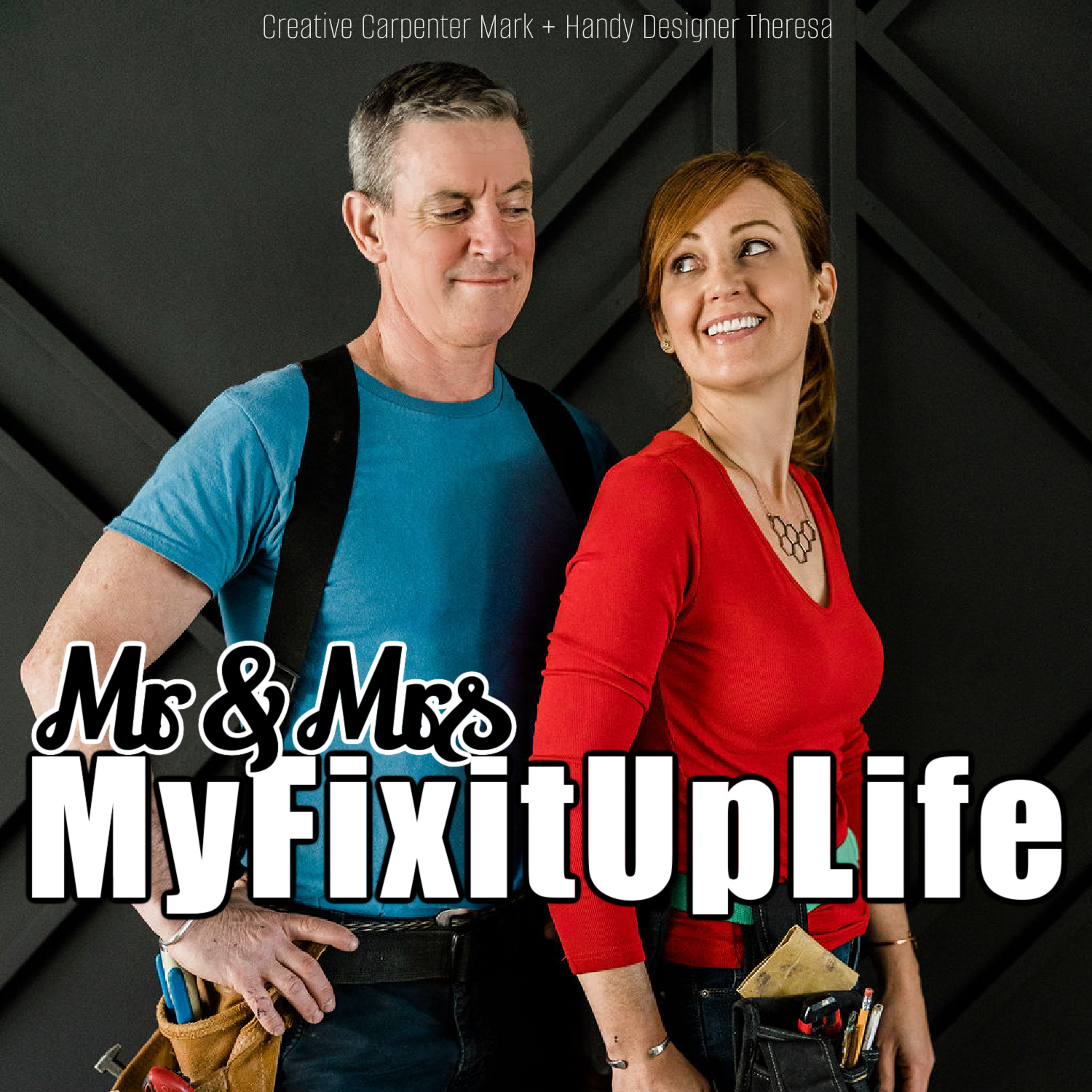
Mark & Theresa learn about The Jon Bon Jovi Soul Foundation, and why Jon is combating issues that force families and individuals into economic despair
About Jon Bon Jovi….”And it was that moment when he was in a warm hotel room looking out thinking that that might be something that he could effect, and he has.”
Theresa: And you are inside MyFixitUpLife with my husband Mark.

Mark: And my wife Theresa. And the sounds and activities of Rebuilding Together.
Theresa: Rebuilding Together in Philadelphia.
Mark: Philadelphia. This is the national project.
Theresa: It is a national project, and it’s pretty exciting that it’s here in Philadelphia.
Mark: It’s fantastic that this work gets done wherever it gets done.
Theresa: And the good thing about Rebuilding Together — they’ve been around for more than 30 years and there are more than 200 thousand volunteers around the country. So if you’re inspired by what we’re talking about today you should go online rebuildingtogether.org and find out where you can volunteer for a project that’s near you.
Mark: That’s for sure. And I’m gonna go all high minded right now and say that it is the mark of a civilized society where those that have can give back to those that need. That’s right. I said it.
Theresa: And we’re joined by another good organization right now too.
Mark: Rockin’ if you will.
Theresa: A rockin’ good organization. The Jon Bon Jovi Soul Foundation — you guys are involved with this Rebuilding Together project, so welcome you guys.
Mimi and Heather: Thank you, thank you.
Theresa: Thank you for being here.
Mimi: Yes we are very involved and glad to be a part of it.
Theresa: And we’re joined by Mimi and Heather. And you guys do a lot of projects around the country with The Jon Bon Jovi Foundation and there was just an award that was given out recently too in New York that you went up for.
Mimi: Yes, on Monday night we received the Covenant House International Beacon of Hope Award. And Jon Bon Jovi and Leo Carlin from our foundation were honored and accepted the award on our behalf.
Theresa: That is so exciting.
Mimi: It was very exciting. It was a phenomenal night.
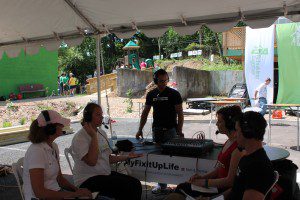
Mark: And that is also strangely parallel universe because I won’t say how many years ago when Covenant House was I think a young organization, their principal spoke at my college graduation.
Mimi: Gosh, fantastic. It’s a full circle.
Mark: It’s funny that we all know the same people. That’s spectacular.
Theresa: And for everyone listening, you want to go onto jonbonjovisoulfoundation.org and check out the information while we’re talking about it.
Mark: Absolutely yes. And while Jon himself grew up in this area, in the Philadelphia region New Jersey that kind of thing, it is a national organization so it’s not just located here. And Mimi could you actually speak more to that a little bit?
Mimi: Sure. First of all with jonbonjovisoulfoundation.org Heather has already posted some pictures from this event — the volunteers that were out here yesterday.
Heather: Yup all the photos from yesterday are already up.
Mark: Are there any of me?
Heather: Not yet but we’ll make sure we get you up there.
Mimi: It felt like we had 200,000 right here on site yesterday. It was amazing. Just as today also. But the Soul Foundation is an organization that helps people that are experiencing economic difficulty. And primarily our focus has been on homelessness, housing, and hunger. We do work throughout the country. We’ve worked in California, Los Angeles, Colorado, Atlanta, Detroit, a lot of work in Philadelphia with Project H.O.M.Eand Sister Mary Scullion and Joan McConnon’s organization. And also a lot of work across the river in New Jersey. We’ve done work in Camden as well as Newark.
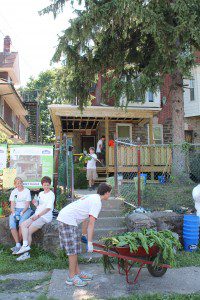


Mark: So if you’re listening around the country, it could be easy to get involved with your organization, specifically if you live anywhere that’s not Philadelphia.
Mimi: We don’t do volunteer programs or projects around the country on an ongoing basis but whenever we do Heather will put it on the website.
Heather: Yup we have it up on our website, we have a volunteer section and even if it’s not a project we’re specifically running, if we have a community partner, for example we partnered in Detroit with Habitat for Humanity, they’re always looking for volunteers so we do have their link up on our website. So even if it’s not something we’re directly working on at the moment, we have plenty of volunteer opportunities from our community partners that we’ve worked with in the past.
Theresa: And you tweet that out, too. So follow you guys on Twitter @JBJSoulFound.
Heather: Yup.
Theresa: Yes. We follow you.
Mark: Awesome.
Heather: Great, thank you.
Mark: Now Jon himself, he could — like any person that’s achieved his level of achievement and fame and notoriety and so forth, could apply his philanthropic nature to anything — kids in Africa, the environment you know whatever it is — why is it this?
Mimi: They are all really great missions and projects that others work on, but as you know, being in the non-profit world you have to narrow your focus. So our focus being homelessness, housing and hunger first started through his noticing a homeless person here in Philadelphia huddled up against the walls of City Hall one cold winter night, and he thought now there’s a problem to which I might be able to help with a solution. And it was that moment when he was in a warm hotel room looking out thinking that that might be something that he could effect, and he has.
Theresa: Now listening to you, I feel there’s a song there. Was there a song that was developed out of that?
Mimi: Actually I’m not sure about that specifically.
Theresa: Because it was very poetic listening to you describe that.
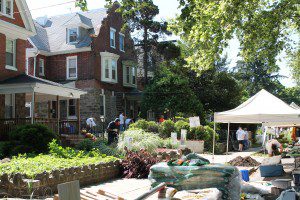


Mark: And without taking that too far, I can actually hear the emotion in your voice.
Theresa: Yes.
Mark: Like you don’t just work there, you’re committed to this idea I can feel it. I don’t even have to ask.
Mimi: Thank you.
Mark: It’s wonderful. Heather I’m not so sure about you. Ha ha.
Mimi: Ha ha, she Tweets. You don’t get her voice.
Mark: Heather, how did you come to this whole thing?
Theresa: And that’s for staying with us through the entire interview and not leaving because I would totally be okay if you left right now. He offends a lot of people.
Mark: That would have been like one of those you know like on The View where people put their stuff down and leave…yeah, you could have done that.
Heather: No, no not at all. I actually started working for the Philadelphia Soul Arena football team and I did their marketing and community relations, and when the league suspended operation at the end of 2008, I was the last one still at the office and I had worked with Mimi a lot and she was the only one at the Foundation working and so asked if I would come on board and I gladly accepted. It’s my first experience in non-profit, but I absolutely love it, believe very strongly in our mission, and I’ve been there since 2009 so I love it.
Mimi: So we could sum that up as last man standing and I grabbed her.
Heather: And I’m very glad that it happened.
Theresa: So you were the only one working there at that time?
Mimi: Yes, I had just started the Foundation a couple years prior to that, and Jon and the board of directors had asked me to stay on as the original executive director. So originally I was doing everything myself. Finding projects in which we would get involved, copying, you know doing everything. Trying to do some social media — thank you Heather. But it was a one-person show there for the first couple of years getting started.
Mark: We don’t know anything about that.
Theresa: Can you describe what you guys have been able to achieve? You know to accomplish your mission and do you know how many people you’ve touched and what has come of what you’ve done?
Mimi: We’ve just passed our 6-year mark, so at that time we kind of took a step back and looked at the number of houses we have done and we’ve participated in over 300 units of housing for people around the country. And I said to Heather, ‘I think it’s time now for us to go back to visit the people whose lives we thought we would be affecting by renovating their house or providing a new home for them and lets get their personal stories.’ So she’s actually in the process of gathering some of that information now.
Theresa: Really?
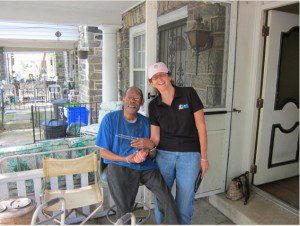


Heather: Yes.
Theresa: Oh that is really good. So you’re traveling around the country and you’re gathering up these stories and you’re going to probably put them on the website?
Heather: Yup that’s our goal. That’s what I’m working on right now with all of the partners we’ve worked with in the past is to reach out to the homeowners and as long as they are willing to speak to us, you know get their stories and see how their lives have changed.
Theresa: Well I want to check in with you after you gather all those stories.
Heather: Yes, that would be great.
Theresa: Because it’s one thing you know volunteering for a day like here at Rebuilding Together and helping the community, but then to see what happens after you leave.
Mimi: Right, and that’s what it’s all about. When you walk the street of North 62nd street here in Philadelphia, I love to just stop and talk to the homeowners that are standing outside their house and just watching the transformation. But it’s an entire neighborhood transformation. I mean when all the trucks pull away and all the PODS are emptied and furniture put back in their homes, when you walk down that street it won’t be recognizable from what it was.
Theresa: That’s the thing too is they are all coming out of their houses and I imagine that neighbors are meeting neighbors that they haven’t met before.
Mimi: Absolutely.
Theresa: Or spent this much time with each other.
Mimi: Lot of interaction over there, it’s great.
Theresa: That’s wonderful.
Mark: And what you were saying about when the trucks pull away and you sort of go back to where it all started, is that like really the real first day of the project because now they have what they need to do what they need to do.
Mimi: They have healthy homes. They have homes in which they can raise, sometimes there’s three generations of a family living in one of those homes. So they have the ability to move on with their life and not have to worry about ‘Do I pay for the repair for my roof, or do I feed the grandchildren?’ So those choices will be removed from their lives.
Mark: That’s not a choice I want to have to make.
Theresa: No that’s not a choice that anybody should have to make.
Mark: And I want to ask this question too, and I don’t mean to be too dramatic, but we’ve visited here at the Overbrook Center where this is happening with your organization and Rebuilding Together, and I kind of see a line. Something, in the case of the Overbrook Center, that was about to be nothing. But now it’s something. And in your projects around the country do you see that as a doorstop for neighborhoods from slipping off the edge? When you see nothing and you make it something and that starts to turn a corner.
Mimi: Absolutely. And there are certain elements that we look for in every project that we do, and obviously housing is one of them, but another critical element are the wrap around services and the commitment that they community themselves are willing to make to what’s happening. And if you’ve met Jerome you know the commitment that’s being made to this center.
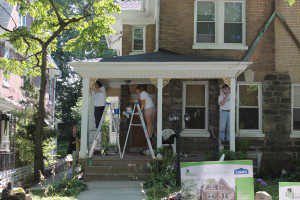


Theresa: And Heather, since you’ve joined this organization, when you’re walking around in your regular life, do you look at neighborhoods in a different way now? And do you see an opportunity for a neighborhood to get better or a house to get better? Has it changed your outlook on the way you’re seeing the world?
Heather: Oh it definitely has. And on a daily basis you walk around, especially down in center city, and when you leave — our office is right there when you kind of branch out a little bit from the city — you know you see people in need and you think how can I help, who can we reach out to? And running our website and all the emails we get on a daily basis and the stories that we hear, you just want to be able to help. And even if we can’t do it directly, direct them to someone who can assist, who is in their community. So it definitely changes the way that you look at things.
Theresa: That’s very cool.
Mark: That’s incredible to see that you’re both a direct participant and a clearinghouse as it were for other organizations to help these neighborhoods that are trying very hard to help themselves. And unfortunately, we have to help ourselves to a break. So follow the Jon Bon Jovi Soul Foundation on Twitter, visit them on Facebook, and check out their website jonbonjovisoulfoundation.org.
Theresa: And we’ll be back in just a minute with more MyFixitUpLife.
